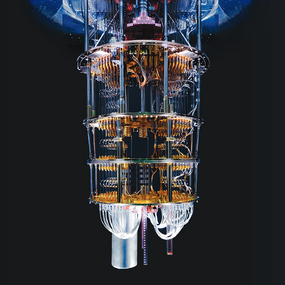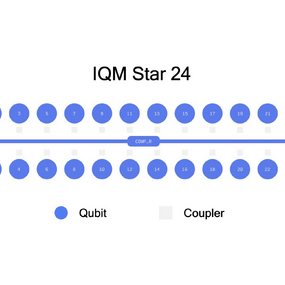Luxembourg, 26 September 2024 – Europe has taken another step towards enhancing the European quantum computing infrastructure by signing a contract for the acquisition of the LUMI-Q consortium's quantum computer. The quantum computer will be housed in Ostrava, Czech Republic, at the IT4Innovations National Supercomputing Center, part of the VSB – Technical University of Ostrava. The contract was signed between the European High-Performance Computing Joint Undertaking (EuroHPC JU) and IQM Quantum Computers, the company selected to supply the unique technology.
Quantum computers have the potential to solve problems that are currently beyond the reach of classical computers, addressing challenges that are either extremely difficult or practically impossible to solve using current methods. Although quantum computing is still in its developmental stage, with its full capabilities yet to be fully realised, advancements in this field are progressing rapidly. As these technologies mature, quantum computers are expected to revolutionise numerous scientific disciplines, opening new frontiers in research and innovation.
LUMI-Q: A Quantum Computer with Revolutionary Topology
The LUMI-Q consortium’s quantum computer will be based on superconducting qubits in a star-shaped topology. This topology minimises the number of so-called swap operations, enabling the execution of highly complex quantum algorithms. The system will feature 24 physical qubits connected to a central resonator.
“We are excited to have a quantum computer with this unique topology. This architecture will significantly improve the efficiency of computations and the scalability of our system. The star topology offers optimal connections between qubits, minimising error rates and increasing the reliability of quantum operations. Thanks to this topology, we can better utilise quantum entanglement and achieve faster and more accurate results in a wide range of applications, from artificial intelligence to complex system simulations,” said Branislav Jansik, Supercomputing Services Director at IT4Innovations.
The LUMI-Q consortium’s quantum computer will be accessible to a broad spectrum of European users, from scientific communities to industry and the public sector. This quantum computing infrastructure will support the development of a diverse range of applications with industrial, scientific, and societal significance for Europe, expanding European supercomputing infrastructure with new technologies. The system will enable European end-users to actively explore applications and algorithms tailored to the new star topology, such as the Quantum Fourier Transform (QFT), a central part of many quantum algorithms showing exponential speed-ups compared to purely classical processing.
“The LUMI-Q effort is a testament to the success of the pan-European identity of the LUMI concept. LUMI-Q opens up the possibility for hybrid computing on the EuroHPC supercomputing platforms, ensuring European users early access to the emerging field of quantum-accelerated HPC,” says Kimmo Koski, Managing Director for CSC – IT Center for Science. CSC operates the EuroHPC LUMI supercomputer in Kajaani, Finland, in collaboration with the LUMI consortium.
LUMI-Q’s Exceptional Position in Europe
The topology of this quantum computer makes it a globally unique installation for quantum computing. The LUMI-Q system will be integrated into the petascale supercomputer Karolina and hosted at the IT4Innovations National Supercomputing Center, the coordinator of the LUMI-Q consortium.
The total acquisition cost of the system is EUR 5 million, with EuroHPC JU financing 50% of the expenses and the LUMI-Q consortium covering the remaining 50%. This consortium represents a truly pan-European collaboration involving eight European countries: the Czech Republic, Belgium, Denmark, Finland, Germany, the Netherlands, Norway, Poland, and Sweden.
“Installing the LUMI-Q quantum computer in Ostrava represents both a technical success and strategic achievement for us. This infrastructure will enable us to advance the development of quantum technologies and support Europe’s efforts to become a leader in this field. We look forward to close cooperation with our partners within the consortium,” added Jansik.
The system is expected to be operational within one year of the contract signing.
“LUMI-Q is a project that can potentially change how Europe utilises quantum computing. We are thrilled to have been selected as the supplier and to contribute to this innovation that will push Europe to the forefront of the global quantum revolution,” said Mikko Välimäki, Co-CEO of IQM Quantum Computers.
LUMI-Q Consortium
The LUMI-Q consortium will provide a pan-European environment for quantum computing integrated into the EuroHPC infrastructure. The proposed concept allows the integration of the EuroHPC target quantum computer into several EuroHPC supercomputers, including the KAROLINA supercomputer in the Czech Republic, LUMI in Finland, and EHPCPL in Poland. The LUMI-Q consortium brings together eight European countries: the Czech Republic, Belgium, Denmark, Finland, Germany, the Netherlands, Norway, Poland, and Sweden.
LUMI-Q consortium partners:
- University of Hasselt, Belgium
- Coordinator: VSB – Technical University of Ostrava, IT4Innovations National Supercomputing Centre, Czech Republic
- Danish Technical University, Denmark
- CSC – IT Center for Science, Finland
- VTT Technical Research Centre of Finland Ltd, Finland
- TNO Netherlands Organisation for Applied Scientific Research, Netherlands
- SURF BV, The Netherlands
- Sigma2 AS, Norway
- Simula Research Lab, Norway
- SINTEF AS, Norway
- Academic Computer Centre Cyfronet AGH, Poland
- Nicolaus Copernicus Astronomical Center, Poland
- Chalmers University of Technology, Sweden


